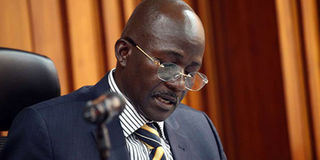Judge orders release of 10m kilos of Kebs-barred rice

Mombasa High Court Judge Eric Ogola. He has said it is Kebs’ duty to ensure that goods entering the country are properly verified. PHOTO | FILE | NATION MEDIA GROUP
What you need to know:
- The rice was part of the consignments of sugar and rice netted as part of the ongoing crackdown on corruption.
- The judge also prohibited the multiagency team from interfering with Phoenix Global Kenya Ltd’s proprietary rights.
Kenyans might have to consume 10 million kilos of rice the Kenya Bureau of Standards (Kebs) had condemned for destruction after a Mombasa court ordered the release of the consignment.
Taxpayers will also have to pay the importer Sh15 million in general damages for Kebs’ “unlawful and illegal detention” of the 10,327 tonnes of rice.
Delivering the ruling, Mombasa High Court Judge Eric Ogola also directed that Phoenix Global Kenya Ltd’s rice, valued at more than Sh250 million, and which is being held at a warehouse in Mombasa by a multiagency team, be released immediately.
“The Kenya Revenue Authority (KRA), Director of Criminal Investigations (DCI) and Kebs are hereby ordered to forthwith open the warehouse and hand over to the petitioner (Phoenix) the said consignment of rice,” Justice Ogola said.
CORRUPTION
Phoenix Global Kenya Ltd, owned by tycoon Bireni Jasani, had sued the multiagency team, saying it had unjustifiably denied the company access to the warehouse where its consignment is stored on allegations that the commodity was substandard.
The judge argued that the integrity of the sampling carried out by the Directorate of Criminal Investigations was “questionable”, “the alleged size variations are negligible” and “the method used to determine the percentage of broken rice was not scientific”.
The rice was part of the consignments of sugar and rice netted as part of the ongoing crackdown on corruption, and which has recently put the Judiciary on the spot.
The multiagency team, comprising the Attorney-General, KRA, Kebs, the Anti-Counterfeit Agency (ACA) and DCI, was appointed by the government to establish the quality of sugar and other commodities in a crackdown on contraband goods.
QUALITY
While there has been a crackdown at Kebs, where importers were found to be colluding with pre-shipment inspectors and quality inspectors at the port of Mombasa and some tax officials to allow the entry of substandard goods into the country, the judge said the re-inspection of the rice and sampling “was deliberately skewed, and in some cases deliberately wrong, to achieve a particular result”.
According to the pre-inspection contracts, all goods clearly classified as having failed Kebs quality tests should be either returned to the country of origin or destroyed.
Kebs has been on the spot for failing to take action against pre-inspection companies that allow the importation of substandard products.
Justice Ogola said it is Kebs’ duty to ensure that goods that enter the country are properly verified, and that it is its reports that prompt other agencies, including the KRA, to act.
“Kebs failed to recognise the results of verification (of the rice) from its own contacted agents. It has not sacked or complained to those agents,” Justice Ogola noted.
VERIFICATION
But while he said Kebs had not behaved professionally, he also allowed the rice to be released for sale.
“At one time it accepts verification reports, but when it is convenient it denies the same. How will Kenyans believe this statutory body when it changes its decisions are like a chameleon changing its colours?” Justice Ogola asked.
He said Kebs must act professionally, and its officers must do the job they are paid for, or else they must be prepared to individually answer for their negligence.
“I am satisfied that the blame in this petition must fall solely on Kebs; KRA has properly done its statutory duty and cannot be blamed for the shortcomings of Kebs,” Justice Ogola ruled.
The judge also prohibited the multiagency team from interfering with Phoenix Global Kenya Ltd’s proprietary rights or its access to the rice at the Mitchell Cotts warehouses, or for the purpose of depositing further consignments.
PROFESSIONAL
He said the court had found that the rice was properly verified, and a pre-verification certificate issued as required, so there is no valid reason for keeping it in the warehouse.
“It is the finding of this court that the rice met all the import required standards as well as the quality as to size and is forthwith released to the petitioner for sale,” he said.
The court also noted that the importer did not flout any law to allow the respondents to detain the rice.
The court also said the multiagency team is free to carry out its legal mandate, but it does not have the freedom to destroy the petitioner’s business in the process.
The judge accused the multiagency team of acting in bad faith and quashed the protection offered by Section 227 of the East African Community Act and ordered Kebs to pay the damages.





